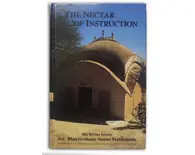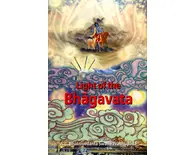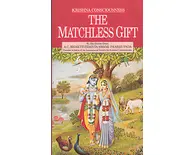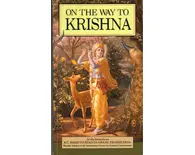Customers who bought this also bought
The Nectar of Devotion [1972 Edition]
Light of the Bhagavata
Easy Journey to Other Planets
The Matchless Gift
On the Way to Krishna
About this item
The Brahma Samhita is a Sanskrit Pancaratra text, comprised of verses of prayer spoken by Brahma to Govinda or Krishna at the beginning of creation. It is revered within Gaudiya Vaishnavism, whose founder, Chaitanya Mahaprabhu (1486-1534), re-discovered a part of the work, the 62 verses of Chapter 5, when visiting a temple in the Kerala, Southern India in the 16th Century which had previously been lost for many centuries.[1] The text contains a highly esoteric description, with the Kama-Gayatri, of Krishna in His abode Goloka.
In 1971 George Harrison produced a modern recording of these prayers along with the Hare Krishna devotees of the Radha Krsna Temple in London entitled 'Govindam', taking it's title from the main chorus line of the prayer "govindam adi-purusham tam aham bhajami" meaning "I worship Govinda, the primeval Lord"
The recovered fragment of the Śrī Brahma-samhitā commences at the fifth chapter. Sloka 5.1 states:
īśvarah paramah krsnah, sac-cid-ānanda-vigrahah
anādir ādir govindah, sarva-kārana-kāranam
Which translates to:
Krishna who is known as Govinda is the Supreme Godhead. He has an eternal blissful spiritual body. He is the origin of all. He has no other origin and He is the prime cause of all causes.
The text was first translated from Sanskrit into English by Bhaktisiddhanta Saraswati Thakur in 1932 and is often sung or recited as a both devotional and philosophical text.
Have a question?
Customer questions & answers
Q:Want to know the following details. 1.Size of book. 2. Paper quality/type. 3. Binding type.
A:
Customer Reviews
Brahma Samhita is very nice but I would not recommend it for the beginner. It contains highly esoteric descriptions of Goloka dhama and Krishnas transcendental lila in the spiritual world. As is said ...Read moreBrahma Samhita is very nice but I would not recommend it for the beginner. It contains highly esoteric descriptions of Goloka dhama and Krishnas transcendental lila in the spiritual world. As is said in the introduction, one should first be familiar with scriptures like Bhagavad Gita and Srimad Bhagavatam. Afterwards you can enjoy it much more. Nice Edition too, and it was delivered carefully, I received it in a good condition. It would be very nice if soon there would be a hardbound Edition of Brahma Samhita, because it is such an important text.Read less
There is nothing like this. Srila Bhaktisiddhanta Saraswati Goswami has unmatched intelligence, he is truly qualified to purport this mysterious, difficult text. I feel more intelligent after reading ...Read moreThere is nothing like this. Srila Bhaktisiddhanta Saraswati Goswami has unmatched intelligence, he is truly qualified to purport this mysterious, difficult text. I feel more intelligent after reading just a little of this bookRead less
This book is full of all the knowledge of the spiritual world as well as the material world, written in very scholarly English by HDG Bhaktisiddhanta Saraswati Thakura.This book is full of all the knowledge of the spiritual world as well as the material world, written in very scholarly English by HDG Bhaktisiddhanta Saraswati Thakura.Read less
A beautiful little book! Arrived in pristine condition. Absolutely overjoyed with this drop of nectar! Haribol!A beautiful little book! Arrived in pristine condition. Absolutely overjoyed with this drop of nectar! Haribol!Read less
A beautiful, small book. Arrived in perfect condition, a timeless classic.A beautiful, small book. Arrived in perfect condition, a timeless classic.Read less

![The Nectar of Devotion [1972 Edition] The Nectar of Devotion [1972 Edition]](https://krishnastore.com/images/cache/Nectar-of-Devotion-2018-cover-195x155.webp)
![Teachings of Lord Caitanya [1968 First Edition] Teachings of Lord Caitanya [1968 First Edition]](https://krishnastore.com/images/cache/tlc-195x155.webp)

![Bhagavad Gita As It Is [1972, Complete Edition] Bhagavad Gita As It Is [1972, Complete Edition]](https://krishnastore.com/images/cache/BGC-195x155.webp)
![Beyond Birth and Death [1972 (first) edition] Beyond Birth and Death [1972 (first) edition]](https://krishnastore.com/images/cache/bbd-195x155.webp)


![Perfection of Yoga [1972 (first) edition] Perfection of Yoga [1972 (first) edition]](https://krishnastore.com/images/cache/PerfectionxofxYoga-195x155.webp)

![Teachings of Queen Kunti [From 1978 Edition, Hardcover] Teachings of Queen Kunti [From 1978 Edition, Hardcover]](https://krishnastore.com/images/cache/TeachingsofqueenKunti-195x155.webp)

![Krsna, The Supreme Personality of Godhead [2 Volumes, 1970 (first) edition] Krsna, The Supreme Personality of Godhead [2 Volumes, 1970 (first) edition]](https://krishnastore.com/images/cache/Krsna-Book-2-Volume-New-Set-195x155.webp)

votes